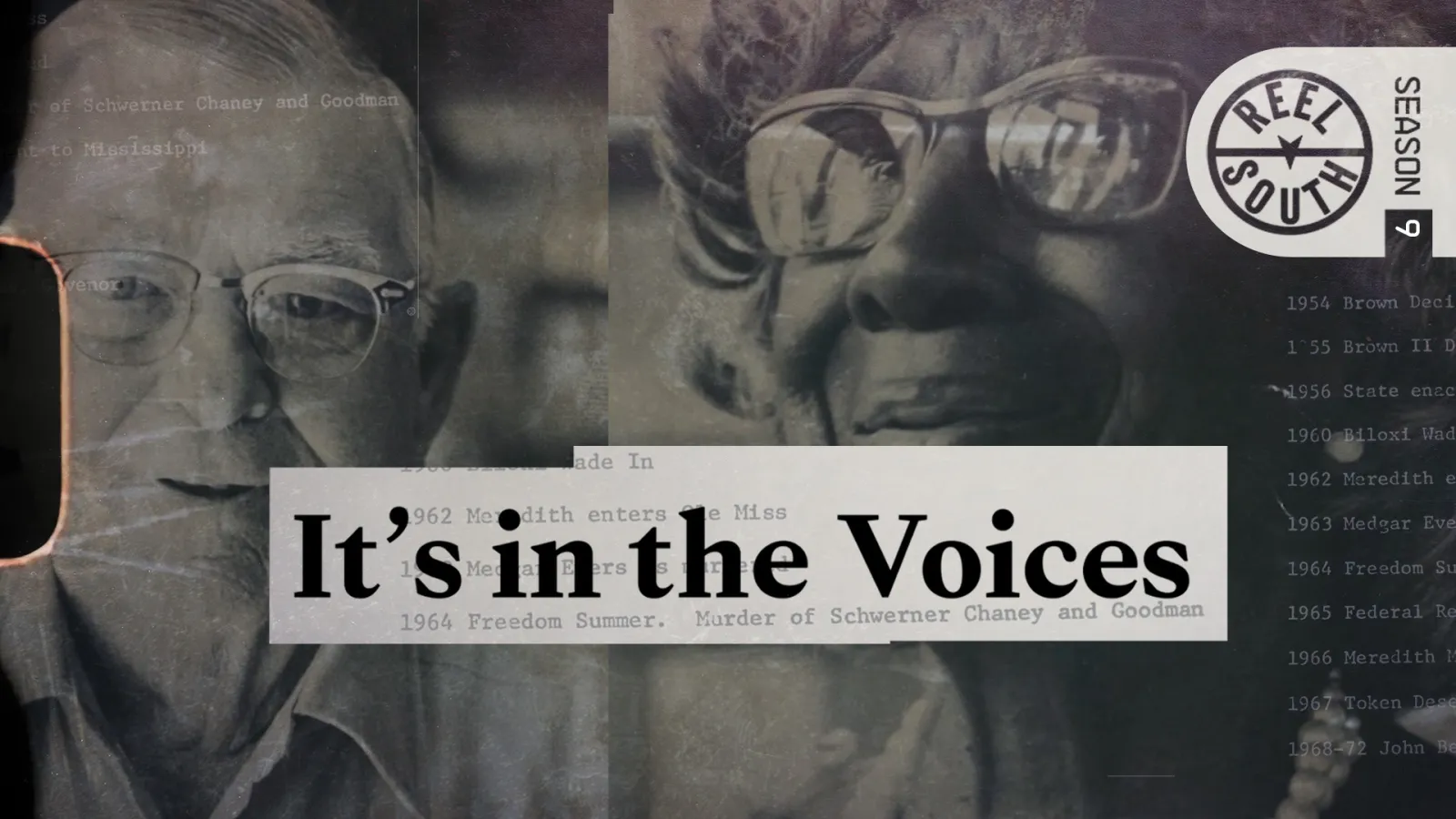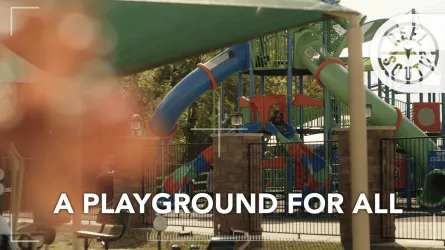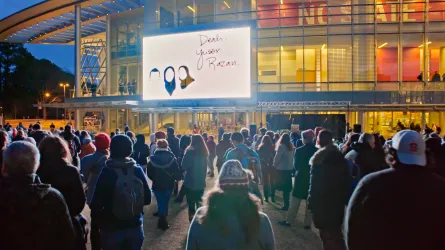Episode 3 of our Season 9 consists of four short films, one of which includes "It's in the Voices," which is about the oral history of a 1920s Mississippi Delta community. Clinton Bagley revisits his first interview from Mississippi’s Washington County Oral History Program, and amongst the files and folders, one piece of material sticks out, the catalyst for the whole program. In a conversation he recorded in 1975 with Daisy Greene, a retired school teacher from his hometown of Greenville, Mississippi, we learn about a devastating flood in 1927, often cruel systems of oppression, and the disparate voices that define the Delta.
Field Humphery is the filmmaker of "It's in the Voices" and before the Reel South premiere of the film, digital producer Heather Nunerley connected with him to speak about the creation of the short. You can watch "It's in the Voices" on PBS today.
This interview has been edited for clarity and length.
Heather: Since the release of "It's in the Voices," what has the reaction been for you?
Field: It's been great. So we've done three festivals, and we've done two local screenings. So pretty limited so far. But we did a screening at two museums in Jackson, Mississippi, and Greenville Arts Council. We did Q&As, which have been really engaging with fantastic feedback. One of Daisy's students was [at Greenville] and we were sharing stories so it kind of turned into this big conversation instead of a typical Q&A, which was really incredible. Shout out to the group. Their response has been amazing. And we're excited to roll it out to larger audiences to see what the reaction is.
Heather: Is there anything that you wish you could have included in the film or are there any moments that you wish you could have captured? I kind of present this question in terms of like, was there a moment where you're like, "Oh, I wish I got that on camera."
Field: So this was kind of my COVID project to stay sane and stay as connected to indie filmmaking as I could. I would have totally loved to have a larger team, a
bigger budget, and more outreach to the Greenville community. I'm based in Central Texas, so I was going back [to Greenville] for Christmas and Thanksgiving trips when I could. I definitely would have loved to include more of the Greenville community, and I definitely would have liked to have tracked down more people related to the families that people interviewed. I mean, I think ultimately I would like for another project like this to happen again, that kind of Daisy and Clint and all them because after this oral history project in the late 70s happened, things really turned in Greenville. And they turned in most communities in America. With projects like this, we can get a better understanding of why that happened.
Heather: What was the biggest challenge for you in the creation of "It's in the Voices" aside from not being in Greenville 24/7?
Field: I would definitely say the finances. The last few years in particular have been really tough on documentary filmmakers. I think you know, we do so many things as filmmakers, the creative side of it, the producing side, and I actually needed to pay for the archival licensing for the audio. But thankfully, there are people who are interested in the project and help out. The Mississippi Humanities Council came through and we got a grant from them, which is huge. But it's just a sign of filmmaking that's, you know, doesn't get talked about a lot. Isn't that glamorous, but we pulled through we got it all done. Got it out the door and now we have this incredible platform.
Heather: I can understand. We hear that a lot. And obviously, we're trying to do our little bit to help that out. What advice would you give to aspiring filmmakers, specifically aspiring documentary filmmakers?
Field: A kick in the butt. I was kind of on the fence about doing this project. Because I kind of knew it was going to be a big undertaking. Ultimately, just do it. Just do it. And I'm so grateful I did and just dove in. If you care about a project if you're passionate about it, just freakin' do it. It's always rewarding. I think one of the special things about being a documentary filmmaker is you become like this little pseudo-expert in the fields that you study and your research shows in projects. This is one of the most fulfilling projects I've ever done. I've learned so much. During this project, I met so many incredible people, understood the places I love much more in different contexts, and saw it through different lenses. So it's been very enriching in that sense. So I would say if you're on the fence about a project, just dive in and do it. Make the film - you can always find a way and the scope of the film may change, but honestly, you can get out there and you can do it.
Heather: You said that you were kind of on the fence. What made you take that leap?
Fields: I think the filmmakers I was working for just gave me a little kick in the butt. They said, "Just like take a camera out there and see what happens." So I took my camera back when we were going back to the Greenville area for Thanksgiving and started getting some B-roll. This started as a completely different project initially just by taking the camera out there and having conversations with people. I think that's how it changed.
Heather: Were you at all reluctant to allow it to morph or was it hard for you to get out of the box of what you thought it was going to be?
Fields: That's a great question. I don't think so. I think once I was diving in and doing research and found the Washington County oral history project, I think that reframed the project and reframed what I wanted it to say. So I was actually very happy to discover it in the lab. There are so many people from outside of the Mississippi Delta that come in and try to tell the story of the Mississippi and ultimately try to tell the story of the American South and the American experience. As filmmakers, we get this ego that we think we can tell it and it's so complex and nuanced. But by taking my hands off the wheel and letting the story take center stage I was like, very thankful to discover it and it took a lot of pressure off by letting it just happen.

Heather: It seems you did exactly what your advice to filmmakers would be: You let the film adapt to what it needed to be and let the voices speak for themselves, not to be too punny about it, but ultimately, it's in the voices. This leads us to the very last question: What is next for you? What do you have to brag about?
Fields: I just edited and Co-produced the documentary that won an audience award at South by Southwest - Faders Up: The John Aielli Experience. We had a fantastic screening at The Paramount here in Austin. It was a very special, special day for us. Really proud of that project and we're excited to get it out.
Heather: Is there anything else that you would like to add? That's all for my questions.
Fields: It's so cool. Especially like a 17-minute short, like there aren't a lot of platforms for that. So I am beyond thankful for y'all. Giving me the opportunity to elevate the story. And share with so many people. I'm not taking it for granted that my little 17-minute film is getting out to PBS stations all over the country. So thank you so much.
Heather: No, we're happy to, and thank you for the work that you do.
Category
Share


